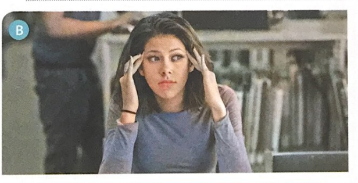Language focus: Possibility and certainty - Unit 4. Feelings - SBT Tiếng Anh 9 Friends Plus1. Choose the correct words 2. Correct the mistakes in bold. Tick the sentence that is correct. 3. Complete the replies with may, must, might not or can't and the verb in brackets.
Lựa chọn câu để xem lời giải nhanh hơn
Bài 1 1. Choose the correct words. (Chọn từ đúng.) may, might, could, can, must Definitely Experts think that animals must have feelings. Possibly Scientists think that elephants (1) must / may express sadness. Animal emotions (2) could / must be an interesting topic to study. Mice (3) can't / might be more intelligent than we thought. Possibly not We (4) might not / could understand everything yet. Definitely not They feel sure that the evidence (5) may not / can't be true. Lời giải chi tiết:
may, might, could, can, must Definitely (Chắc chắn) Experts think that animals might have feelings. (Các chuyên gia nghĩ rằng động vật có thể có cảm xúc.) Possibly (Có thể) Scientists think that elephants may express sadness. (Các nhà khoa học cho rằng voi có thể biểu lộ nỗi buồn.) Animal emotions could be an interesting topic to study. (Cảm xúc của động vật có thể là một chủ đề thú vị để nghiên cứu.) Mice might be more intelligent than we thought. (Chuột có thể thông minh hơn chúng ta nghĩ.) Possibly not (Có thể không) We might not understand everything yet. (Chúng ta có thể chưa hiểu hết mọi thứ.) Definitely not (Chắc chắn không) They feel sure that the evidence can't be true. (Họ cảm thấy chắc chắn rằng bằng chứng không thể đúng.) Bài 2 2. Correct the mistakes in bold. Tick the sentence that is correct. (Sửa lỗi in đậm. Đánh dấu vào câu đúng.) This small creature is really strange. It 1. We not might finish our project on whales today. 2. Those zoo animals don't move around much. They could feel bored. 3. Our cat has just eaten. It don't can be hungry again. 4. Studies suggests that dolphins must to be very intelligent. 5. They might learning more about these animals in the future. Lời giải chi tiết:
1. We might not finish our project on whales today. (Chúng ta có thể không hoàn thành dự án về cá voi hôm nay.) Giải thích: might (modal verb) + not: chỉ việc có thể không làm được 2. Those zoo animals don't move around much. They could feel bored. (Những con vật trong sở thú đó không di chuyển nhiều. Chúng có thể cảm thấy buồn chán.) Giải thích: could (modal verb) + động từ nguyên mẫu: chỉ việc có thể làm được 3. Our cat has just eaten. It can't be hungry again. (Con mèo của chúng ta vừa ăn xong. Nó không thể lại đói nữa.) Giải thích: can’t (modal verb) + động từ nguyên mẫu: chỉ việc chắc chắn không xảy ra 4. Studies suggests that dolphins must be very intelligent.) (Các nghiên cứu cho thấy cá heo chắc hẳn rất thông minh.) Giải thích: must (modal verb) + động từ nguyên mẫu: chỉ việc chắc chắn xảy ra 5. They might learn more about these animals in the future. (Họ có thể sẽ học được nhiều hơn về những loài động vật này trong tương lai.) Giải thích: might (modal verb) + động từ nguyên mẫu: chỉ việc có thể làm được Bài 3 3. Complete the replies with may, must, might not or can't and the verb in brackets. (Hoàn thành câu trả lời bằng may, must, might not hoặc can't và động từ trong ngoặc.) 'Do you know what that animal is over there?' 'Well, it can't be (be) a horse. It's too small.' 1. 'Ollie seems stressed." 'I think he _____ (feel) worried about his driving test.' 2. 'Are you coming to the beach later?' 'I'm not sure. I _____ (come) if I'm tired.' 3. 'That study was very successful.' 'Yes. The scientists _____ (be) very pleased.' 4. 'Why is Marta excited?' 'I don't know. She _____ (have) tickets for that concert. She was trying to buy some online.' 5. 'Is it time to get up?' 'No, it's still dark outside. It _____ (be) morning yet.' Lời giải chi tiết:
1. 'Ollie seems stressed. ' 'I think he may feel worried about his driving test.' ('Ollie có vẻ căng thẳng.' 'Tôi nghĩ anh ấy có thể lo lắng về bài kiểm tra lái xe.') 2. 'Are you coming to the beach later?' 'I'm not sure. I might not come if I'm tired.' ('Lát nữa bạn có đến bãi biển không?' 'Tôi không chắc. Tôi có thể không đến nếu tôi mệt.') 3. 'That study was very successful.' 'Yes. The scientists must be very pleased.' ('Nghiên cứu đó rất thành công.' 'Vâng. Các nhà khoa học chắc hẳn rất hài lòng.') 4. 'Why is Marta excited?' 'I don't know. She may have tickets for that concert. She was trying to buy some online.' ('Tại sao Marta lại phấn khích?' 'Tôi không biết. Cô ấy có thể có vé cho buổi hòa nhạc đó. Cô ấy đã cố mua vé trực tuyến.') 5. 'Is it time to get up?' 'No, it's still dark outside. It can't be morning yet.' ('Đến giờ dậy chưa?' 'Chưa, bên ngoài vẫn còn tối. Chắc chắn chưa đến sáng.') Bài 4 4. Rewrite the underlined sentences with might, might not, must or can't. (Viết lại các câu được gạch chân bằng might, might not, must hoặc can't.) Bradley looks relaxed. He definitely isn't nervous. He can't be nervous. 1. That giraffe seems unhappy. It's possible that it feels sad. _________________________________________________________ 2. Ava called me. Perhaps she won't meet us later. _________________________________________________________ 3. That perfume is a luxury brand. I'm sure it's very expensive. _________________________________________________________ 4. The sky is grey. Maybe it will rain later. _________________________________________________________ 5. Look at the price label! I'm sure it doesn't cost that much. _________________________________________________________ Lời giải chi tiết: 1. That giraffe seems unhappy. It might feel sad. (Con hươu cao cổ đó trông có vẻ không vui. Nó có thể sẽ buồn.) 2. Ava called me. She might not meet us later. (Ava gọi tôi. Có thể sau này cô ấy sẽ không gặp chúng ta nữa.) 3. That perfume is a luxury brand. It must be very expensive. (Chai nước hoa này là nhãn hiệu cao cấp. Nó chắc hẳn rất đắt.) 4. The sky is grey. It might rain later. (Bầu trời xám xịt. Trời có thể sẽ mưa sau.) 5. Look at the price label! It can’t cost that much. (Nhìn vào giá tiền đi. Nó không thể đắt đến vậy.) Bài 5 5. Write sentences about photos A and B. Use may, might, could, can't and must and the words in the box or your own ideas. (Viết câu về các bức ảnh A và B. Sử dụng các từ may, might, could, can't và must và các từ trong khung hoặc ý tưởng của riêng bạn.)
Ví dụ: The woman might be surprised by the horse jumping up. (Người phụ nữ có thể ngạc nhiên khi thấy con ngựa nhảy lên.)
She could be bored of studying. (Cô ấy có thể chán học.) Lời giải chi tiết: A. She could be very frightened. (Cô ấy có thể rất sợ hãi.) The horse must be excited about going in the field. (Con ngựa chắc hẳn rất hào hứng khi được ra đồng.) B. She may feel stressed about revising. (Cô ấy có thể cảm thấy căng thẳng vì việc ôn tập.) She might be worried about her exams. (Cô ấy có thể lo lắng về các kỳ thi của mình.)
>> Học trực tuyến lớp 9 và Lộ trình UP10 trên Tuyensinh247.com Đầy đủ khoá học các bộ sách: Kết nối tri thức với cuộc sống; Chân trời sáng tạo; Cánh diều. Lộ trình học tập 3 giai đoạn: Học nền tảng lớp 9, Ôn thi vào lớp 10, Luyện Đề. Bứt phá điểm lớp 9, thi vào lớp 10 kết quả cao. Hoàn trả học phí nếu học không hiệu quả. PH/HS tham khảo chi tiết khoá học tại: Link
|





















